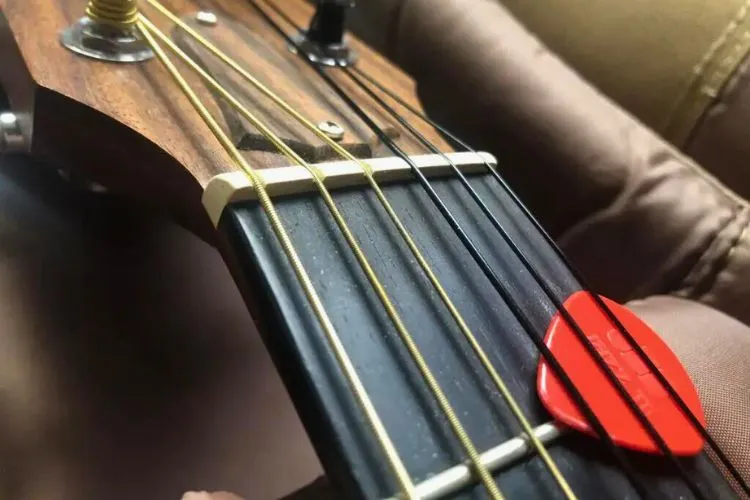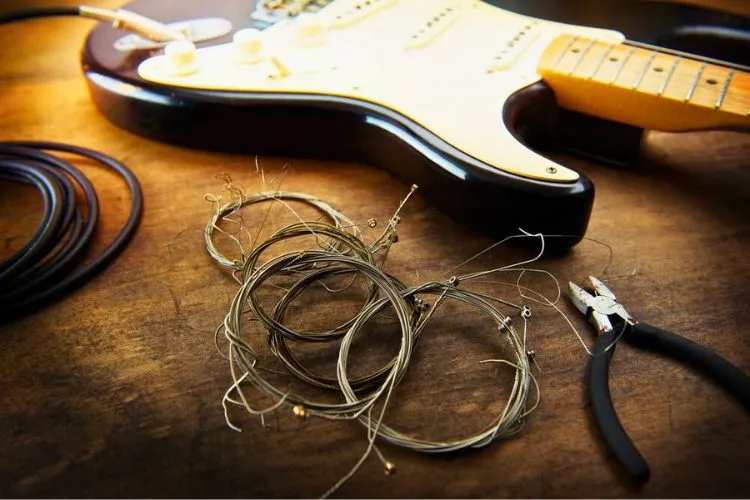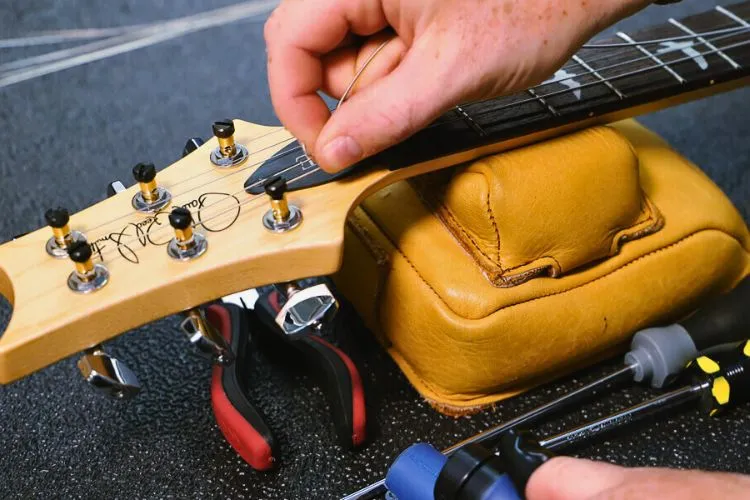When it comes to music, guitars are one of the most popular instruments played by people all over the world.
As any guitarist knows, guitar strings have a limited lifespan, and eventually, they become worn-out or break.
But, are guitar strings recyclable? Have you ever wondered that?
In this comprehensive guide, we will explore the recycling options for guitar strings, giving you valuable insights on how to dispose of them responsibly.

Contents
🎶Are Guitar Strings Recyclable?
Guitar strings are indeed recyclable, and there are several options available for musicians who want to ensure their strings are disposed of in an environmentally-friendly manner.
🎶D’Addario String Recycling Program
One of the prominent initiatives in guitar string recycling is the D’Addario String Recycling Program. This program provides musicians with a convenient and sustainable way to recycle their used strings. Here’s how it works:

How it works?
Musicians can collect their used strings and send them to D’Addario’s designated recycling centers. Participants can find these centers through the program’s website. Once collected, the strings are processed for recycling.
Benefits of participating
By participating in the D’Addario String Recycling Program, musicians can contribute to reducing the environmental impact of guitar string waste.
Moreover, participants can enjoy the satisfaction of knowing that their strings are being recycled and used to create new products.
Steps to recycle guitar strings through the program
To recycle guitar strings through the D’Addario String Recycling Program, follow these simple steps:
- Collect your used strings: Remove the strings from your guitar and keep them stored in a safe container until you are ready to recycle them.
- Find a recycling center: Visit the program’s website and locate the nearest recycling center.
- Ship the strings: Package your used strings securely and send them to the designated recycling center. Details on shipping methods and addresses can be found on the program’s website.
🎶Other Recycling Options
Aside from the D’Addario String Recycling Program, there are other recycling options available for guitar strings.
Local string recycling centers
Check if there are local recycling centers in your area that accept guitar strings. Some regions have specific recycling facilities that accept musical instrument accessories, such as strings.
Consider reaching out to recycling centers or conducting online research to find the nearest location.
Alternative recycling programs and initiatives
In addition to D’Addario’s program, several organizations and initiatives have emerged to provide recycling solutions for guitar strings.
Research and explore these alternative options, as they might offer viable recycling methods or collaborate with other recycling programs.
🎶How to Recycle Guitar Strings?
Now that you understand the recycling options available, let’s delve into the process of recycling guitar strings.

Preparation
Before recycling your guitar strings, it’s essential to prepare them properly to ensure a smooth recycling process.
Removing the strings from the guitar
Carefully unwind and remove each string from your guitar. Take care not to damage the instrument while doing so.
It is advisable to refer to a guitar maintenance guide or consult a professional if you are unsure how to remove the strings safely.
Proper storage and transportation
After removing the strings, store them in a secure container to prevent tangling and damage during transportation. Consider using a small bag or a sealable jar specifically designated for storing used guitar strings.
Recycling Process
Once your guitar strings are ready for recycling, they go through a specific process to convert them into reusable materials.
Sorting and separating the different string materials
Guitar strings typically consist of metal cores wound with various materials such as nickel, steel, bronze, or even nylon for classical guitars.
During the recycling process, the strings are sorted and separated to ensure that the different materials can be properly recycled.
Melting and recycling the metal components
The metal components of guitar strings can be melted down and recycled to create new products. When these metals are properly recycled, it reduces the need for mining new resources and lessens the strain on the environment.
Incorporating sustainable practices in recycling
As awareness about the need for sustainability grows, many recycling centers are taking steps to adopt environmentally-friendly practices.
Some centers use energy-efficient processes, reduce water consumption, or even utilize renewable energy sources to power their recycling operations.
By choosing a recycling center that prioritizes sustainability, you can make a more significant positive impact.
🎶Tips for Reducing Guitar String Waste
Aside from recycling, there are several ways musicians can reduce guitar string waste and extend their lifespan:

Extending the lifespan of guitar strings
Regularly clean and maintain your strings to preserve their quality and prevent premature corrosion. Proper storage, regular string changes, and using protective coatings can also help improve the longevity of your guitar strings.
Proper disposal techniques
If recycling options are not readily available in your area, it is crucial to dispose of used guitar strings responsibly. Place them in appropriate waste bins or contact local waste management authorities to inquire about proper disposal methods.
Consider sustainable string alternatives
Explore eco-friendly guitar string options made from recycled or renewable materials. Some manufacturers have started producing strings with an emphasis on sustainability, providing environmentally-conscious musicians with more choices.
🎶frequently asked question (FAQs)
Guitar strings are generally safe and not considered toxic. However, the metal components of guitar strings can be a choking hazard for children or pets. It is crucial to keep used strings out of reach and avoid accidental ingestion.
Guitar strings made of nylon or other non-metal materials can be recycled, but the recycling processes may vary. Check with local recycling centers or programs to determine if they accept non-metal strings.
To find a local guitar string recycling center, you can utilize online resources or reach out to recycling facilities in your area. They will be able to provide information on whether they accept guitar strings and the specific guidelines for recycling.
While recycling guitar strings through dedicated programs or recycling centers is the recommended approach, some DIY methods or upcycling ideas might exist. However, it is crucial to ensure that these methods are safe and do not harm the environment.
Some organizations may accept donations of used guitar strings. They can repurpose them for various purposes, such as crafting or jewelry making. Research local charities or organizations that accept musical instrument donations to explore donation opportunities.
Conclusion:
By responsibly recycling guitar strings, musicians can make a significant contribution towards reducing waste and protecting the environment.
Participating in programs like the D’Addario String Recycling Program, exploring local recycling centers, and adopting sustainable practices can help create a greener guitar-playing community.
Embrace the opportunity to recycle and ensure that your love for music doesn’t harm the planet. Together, we can build a more sustainable future for both music and the environment.
